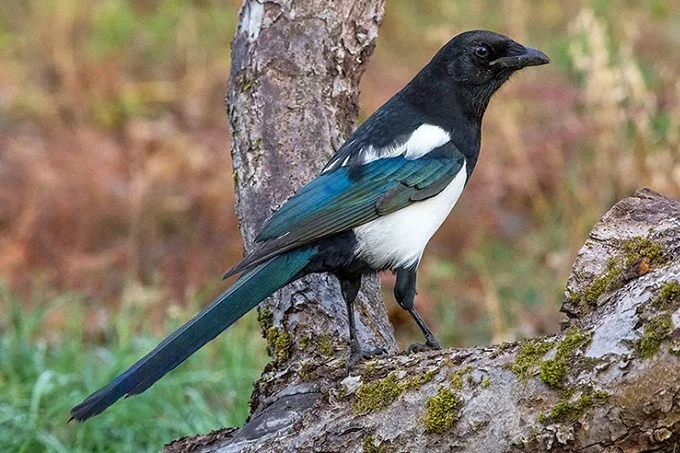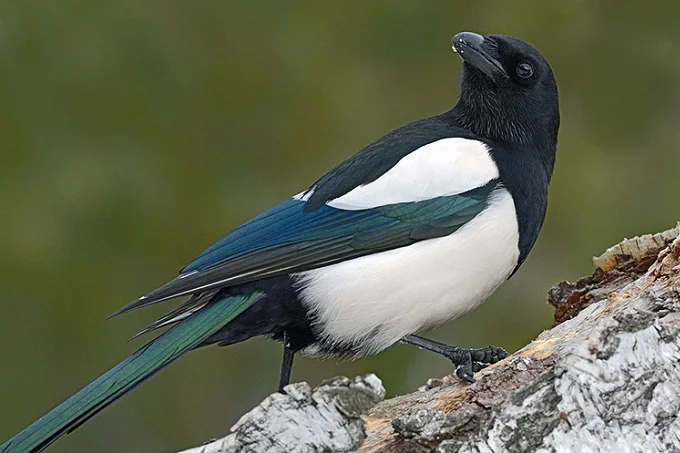The cursed bird

A negative reputation is a dreadful thing: it’s simple to gain but almost difficult to shake off. Take, for example, a magpie! Long ago, the bird had the audacity to refuse to board Noah’s ark and then the folly to ridicule the world’s annihilation. And the upshot is that it is popularly regarded as the devil’s bird, with whom one should avoid contact.
Almost all omens related to magpies in Europe portend calamity. If a magpie flies over a person’s head, for example, he will die shortly. When confronted with a magpie in England, one must remove his hat, spit on its face, and exclaim, “Devil, I renounce you!” In Germany, a rite similar to this one existed.
The name magpie means “black and white plumage” at the same time. In a nutshell, they believe she’s a moron and a superficial person. However, this is not the case. If you insult or mislead such a “chatterbox,” it will remember you, will not forgive you, and will wait for the right opportunity to avenge you. And while she’s waiting, she’ll snare the item she needs from right under the offender’s nose.

Magpies are well-known for their fondness for shiny objects. But why is that? Scientists do not provide a clear explanation. Perhaps the bright things are used by the birds to attract a partner. They may also have an enhanced sense of beauty. Magpies, after all, move their prey about for a long period, as if inspecting it.
Finally, magpies have been shown to have a sense of humor. In any event, many victims who had the misfortune of having a magpie as a pet state that the birds were pleased by the noise that always occurred during the hunt for stolen things.
A mirror test of animal self-awareness confirms the fact that magpies are clever birds. Its essence is as follows: The test subject’s body is painted with two lines, one visible to the naked eye and the other only in the mirror. If an animal or bird can see the second mark, it suggests they can see their “selves” independently from the rest of the environment. Only a magpie, out of all known feathered birds, passes this criterion. That is to say, the magpie is a wise bird. Maybe that’s why it’s so loathed.
Magpies have a long history of being disliked and feared in Russia. They were considered cursed birds in Moscow, and they were “not permitted” to go closer than sixty versts to the city. And there was a good reason for it. There were stories that witches may be taken in the appearance of magpies.
It is sufficient to recollect Marina Mniszech’s narrative. Both False Dmitrievs’ wives spent a year in the tower’s jail and then vanished without a trace. She was alleged to have committed suicide due to boredom. No one, however, has ever seen the body or the grave. “His (False Dimitri’s) nasty wife Marinka the godless changed into a magpie and fluttered out of the rooms,” the tale goes.
However, a magpie’s wickedness is not limited to this. Villages held by the Boyar Stepan Kuchka, the forefather of the Romanovs, formerly stood on the location of the present-day capital. His land was overrun by foes one day. Kuchka buried himself in a secluded wilderness, hiding all of his most prized items.

Without success, robbers looked for the boyar for a long time and would have left empty-handed if a magpie had not pointed to his hiding place with their chirping. The thieves raced to the sound of its voice, where they discovered Kuchka and murdered him. The boyar cursed the magpie for all time as he died.
However, there is a theory that Yury Dolgorukiy is responsible for Kuchka’s death. Unlike himself, he admired the boyar’s possessions. However, the following proverb has remained in people’s minds: “A magpie in Moscow is cursed for giving Kuchka away.”
The most famous tradition about the magpie’s curses stems from the sixteenth century, during Ivan the Terrible’s reign. The Tsar issued a proclamation shortly before his death, ordering that those suspected of witchcraft and other dark activities be collected from all throughout Russia and brought to the capital, where they were imprisoned. They were escorted to the city’s central plaza on the scheduled day.
This was seen by Ivan the Terrible personally. He ordered the wretches to be encircled by straw and burned on fire on all sides in order to eradicate wickedness from the face of the planet and extinguish it forever in Russia. Strange noises like a cat’s meow evolved into a screech were heard as the fire burst out and enveloped the humans. A vast flock of magpies swooped out of the dense black smoke that rose over the throng.
Those in attendance concluded that the witches had transformed into birds in order to avoid the king’s wrath. Ivan the Terrible condemned them for it, shouting after them, “May you be magpies henceforth and forever!” That’s exactly what happened! And magpie is nearly hard to see in Moscow and St. Petersburg nowadays, except in the outskirts.
A magpie, on the other hand, is always welcome in China. It is seen as a sign of long-awaited visitors, pleasure, and joy there. Young people are given representations of this bird as a desire for love and success to the new family, even during weddings.
The magpie is related to another intriguing Chinese ritual. If the couple were to get divorced, they would smash a mirror with a magpie inscribed on it and take a piece for themselves. If the husband or wife was unfaithful, a portion of the mirror transformed into a magpie, which flew to the misled spouse to inform them of the betrayal. In such conditions, it’s understandable that few individuals would dare to commit adultery.
Gerald Durrell, a well-known naturalist, is another magpie admirer. He saw the bird’s skills for what they were worth. Take, for example, its ability to copy human speech: a magpie can learn to imitate human speech for nothing. And it does so on purpose, according to Darrell’s findings.

One day, for example, a magpie learned the instructions given to the dogs by the master. And as soon as he moved someplace, they started issuing commands: “Go away,” “Come here,” causing the dogs to get confused. Another time, magpies learned a chicken feeding signal, and when they heard it, the hens gathered at the kitchen entrance and began clucking. The magpies appeared to enjoy the ruckus caused by the chickens.
Whatever it is, they like having a good time. Gerald Durrell discovered this on his own. After saying his goodbyes to his visitors, he went home to discover magpies perched on the table, right next to a vase of flowers. The table was a jumble of messes. The silverware was strewn around, the oil was splattered over the plates, and the white tablecloth was stained with the prints of birds’ paws. Only fragments of glass served as a reminder of the condiment saucers. A pitcher of water had spilled on the floor.
The perpetrators had not left the scene; instead, they were perched on the vase, chirping and comparing impressions while observing their host’s response. What had occurred became evident when one of the birds, with a broken flower in its mouth, got down from the vase, waddled to the table’s edge, and fainted on the floor, while the other, making a peculiar sound like a chuckle, covered its head behind its wing, and fell asleep almost immediately. Darrell then observed a beer bottle on the floor that had been spilled. The magpies had apparently become inebriated.




